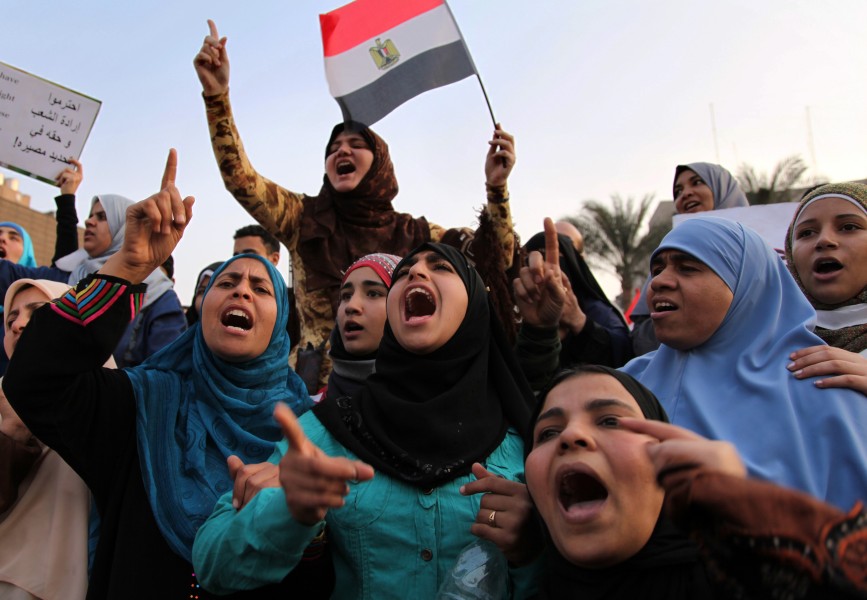Following an uprising in 2011 that toppled President Hosni Mubarak, Egypt has seen the military ouster of President Morsi and now the electoral victory of former military leader General Sisi. The turmoil has resulted in egregious human rights abuses, adding to years of repression under Mubarak. Egyptians continue to demand accountability for decades of political repression. ICTJ has provided technical assistance to remedy past wrongs and create a rights-respecting society.
Egypt

Tens of thousands of anti-Mubarak protesters gather in Tahrir Square on February 1, 2011.
Background: A History of Repression, Cautious Optimism
Since 1952, Egypt has witnessed a succession of authoritarian regimes and waves of repression. The National Democratic Party (NDP)—Egypt’s ruling party established by President Anwar Sadat in 1978—remained in power until 2011, when protests forced President Mubarak to step down after a 30-year rule.
Mubarak’s government and the NDP kept a tight hold on the country through orchestrated elections and an obedient security apparatus. A state of emergency, enacted in 1981, was used to facilitate the arbitrary detention of opposition members and protestors, as well as the unfair trials of civilians before state security or military courts. Torture and ill-treatment were systematically used in prisons and other detention facilities.
In February 2011-after eighteen days of popular protests inspired by the Tunisian revolution against corruption, political violence, and impunity-Mubarak stepped down, transferring power to Egypt’s Supreme Council of Armed Forces (SCAF).
A month later, a national referendum paved the way for new elections. The SCAF suspended the constitution and dissolved parliament while pledging to transfer power to a civilian government elected by the Egyptian people. In June 2012, Mohamed Morsi of the Muslim Brotherhood became Egypt’s first democratically elected President.
In the same month, Former President Mubarak was sentenced to death for “failing to prevent the killing of demonstrators.” However, the verdict was overturned by the Court of Cassation in January 2013. Mubarak’s retrial is ongoing, with the defense seeking acquittal and the prosecution seeking new evidence to yield the death penalty. Scores of police officers or Interior Ministry officials have been acquitted.
To investigate alleged crimes and disproportionate force used against the protestors, a commission of inquiry was established, whose final report found security forces used live ammunition on demonstrators. The report also named several members of the NDP as responsible for the February 2 attacks on the demonstrators in Tahrir Square. President Morsi established another committee to investigate serious abuses by the military, including violent dispersal of sit-in protests, clashes between protestors and the military, and incidents of torture, killings, and sexual assault. Though the committee completed its work in December 2012, it has not released a final report to the public.
During this time, discontent with President Morsi continued to amplify, until the unrest finally caused millions to take to the street, calling for Morsi to relinquish power. In July 2013, Egypt’s army intervened and forced Morsi to step down.
The army temporarily suspended the constitution and police backed by armored vehicles and bulldozers violently dispersed two sit-ins of Morsi’s supporters, killing hundreds of people.
In May 2014, former army chief Abdel Fatah al-Sisi won the presidential election with over 90% of the vote.
Justice for abuses against protestors before, during, and after the uprising remains elusive, and basic freedom of expression continues to be restricted despite objections from NGOs and Egyptian civil society groups. The interim government has enacted a new protest law that forces would-be protesters to seek multiple permissions to take to the streets, bans overnight sit-ins and any unsanctioned gatherings of 10 or more people.
Institutionally, the interim government has newly created the country’s Transitional Justice and National Reconciliation Ministry. However, despite rhetoric of reform and accountability, the country has not put forth a comprehensive transitional justice strategy and faces enormous challenges to rebuild basic trust between civilians and the state.
ICTJ's Role
ICTJ’s involvement in Egypt aims to provide technical assistance and advice to local actors on transitional justice options and strengthen their capacity to respond to the challenges of the current situation.
-
ICTJ has visited Egypt to meet with local actors-including officials, judges, human rights activists, journalists, victims’ groups, women’s groups, and youth organizations-to identify how Egyptians understood their needs from a transitional justice viewpoint. We have responded to those needs in some cases; for example, we have provided training in the documentation of human rights violations to human rights activists. In addition to local actors, ICTJ has also met UN, EU, and World Bank officials to discuss possible cooperation.
-
ICTJ was a key international partner and co-organizer of the conference “Transitional Justice in Egypt and MENA region: Challenges and Possibilities” in October 2011. The conference examined transitional justice options including reparations, criminal accountability and vetting in post-Mubarak Egypt.
-
ICTJ continues to liaise with key civil society actors and develop analysis on the opportunities for challenging the legacy of human rights abuses.